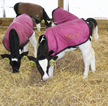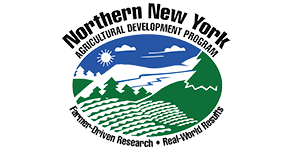 Northern NY; April 10, 2018. The 2018-19 New York State Budget includes $600,000 for the farmer-driven Northern New York Agricultural Development Program that prioritizes research and technical assistance to benefit the dairy, livestock, field crops, fruit, vegetables, maple and honey production industries in Clinton, Essex, Franklin, Jefferson, Lewis, and St. Lawrence counties.
Northern NY; April 10, 2018. The 2018-19 New York State Budget includes $600,000 for the farmer-driven Northern New York Agricultural Development Program that prioritizes research and technical assistance to benefit the dairy, livestock, field crops, fruit, vegetables, maple and honey production industries in Clinton, Essex, Franklin, Jefferson, Lewis, and St. Lawrence counties.
Nearly 100 farmers from across the six-county region participate in identifying projects and targeting funding to address uniquely Northern New York challenges, and to maintain and grow the regional agricultural economy at the farm level and industrywide.
Funding for the Northern New York Agricultural Development Program is supported by the New York State Senate and administered by the New York State Department of Agriculture and Markets.
“The work done by the Northern New York Agricultural Development Program is critically important to our farmers’ bottom lines and its research helps to strengthen key sectors of New York’s leading industry, including maple, dairy, and others, that are important to our region,” said Senate Agriculture Committee Chair Senator Patty Ritchie. “I was proud to advocate for this important funding and look forward to seeing how it strengthens our agriculture industry as a whole.”
NYS Senator Betty Little noted, “The Northern New York Agricultural Development Program makes efficient use of its state funding to address the critical needs of the diverse farming sectors and the North Country farmers that are essential economic drivers in our regional communities.”
“Without the hard work and perseverance of the state’s farmers, New York would not be the agricultural engine that it is today,” added NYS Senator Joseph Griffo. “This funding for the Northern New York Agricultural Development Program will help continue the important research for and provide assistance to farmers throughout the state to ensure that they continue to thrive for many more generations to come.”
Recent projects have addressed Northern New York microclimate impact and shorter growing season, as well as the potential to grow into a regional maple production capacity of $10 million per year, and the use of high tunnels for year-round fruit and vegetable production.
The January 2018 Northern New York Agricultural Development Program report highlights projects that focused on helping dairy cows and calves adjust to localized hot and cold climate extremes, applying tile drainage to improve field crop production and stewardship, advancing maple production, developing new opportunities for fruit and vegetable growers, and the results of the first-ever Northern New York bee health survey. Project results are posted on this website.
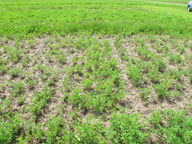
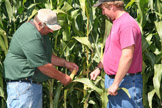 NNY Corn Grain Evaluation Helps Farmers Select Seed, Feed Cows, Sell to Ethanol Producers
NNY Corn Grain Evaluation Helps Farmers Select Seed, Feed Cows, Sell to Ethanol Producers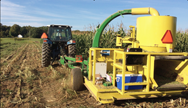
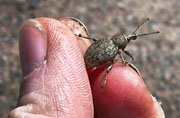 Ithaca, NY; February 27, 2018. Northern New York farmers interested in protecting their alfalfa crops from the devastating alfalfa snout beetle can take advantage of discounts from the Cornell University laboratory raising the biocontrol nematodes that have been proven to reduce not only populations of snout beetle, but other crop pests as well.
Ithaca, NY; February 27, 2018. Northern New York farmers interested in protecting their alfalfa crops from the devastating alfalfa snout beetle can take advantage of discounts from the Cornell University laboratory raising the biocontrol nematodes that have been proven to reduce not only populations of snout beetle, but other crop pests as well.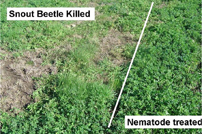 Recent field trials funded by the Northern New York Agricultural Development Program indicate that the biocontrol nematodes are also having an impact on corn rootworm after a field treated with the nematodes is rotated from alfalfa into corn.
Recent field trials funded by the Northern New York Agricultural Development Program indicate that the biocontrol nematodes are also having an impact on corn rootworm after a field treated with the nematodes is rotated from alfalfa into corn.
